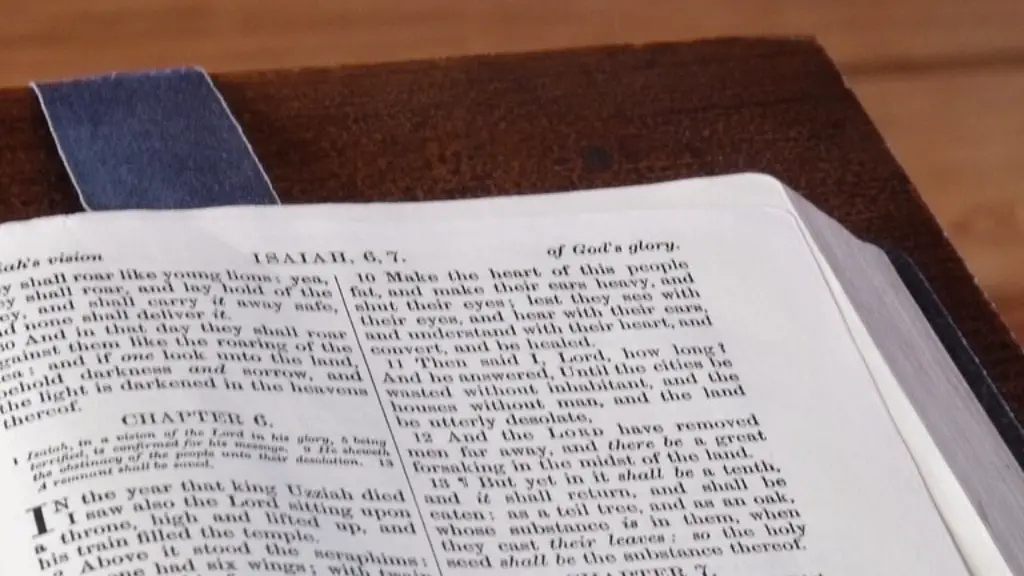The Bible is an ancient and complex collection of texts, and at first glance, it may not be immediately obvious whether it mentions unicorns. While the word ‘unicorn’ is never explicitly written in the Bible, there are references made to the creatures that are commonly interpreted in modern times as describing a unicorn. To investigate whether the Bible mentions unicorns, it is necessary to explore the original Biblical language and look beyond the literal interpretation of the words.
In Hebrew, the words re’em, r’m, and r’meem are used several times throughout the Bible. The idea of a unicorn as a single-horned horse-like creature was popularized by the Latin Vulgate bible translation, where the word unicornis is used to replace the Hebrew re’em. However, more recent interpretations of what the words re’em and r’m mean generally agree that they are referencing the auroch, an extinct wild ox that corresponds to what is now called cattle.
Exploring the original Hebrew and ancient history can help explain the unicorn reference. In Job 39, the book describes a powerful animal that no human has strength or wisdom to control or even approach it. In Hebrew, this creature is referred to as the ‘re’em.’ The Bible then goes on to describe its meaning as an animal with great strength and wisdom living in the desert. Both of these descriptions fit the description of an auroch.
In Psalm 22 and Numbers 24, the words re’em and r’m are used in the same context, describing the unicorn as a powerful and fierce animal. It is commonly understood that aurochs were more powerful and had more strength than horses, and they were more commonly found in the wild. In addition, they are also believed to have been fierce and powerful creatures that did not fear humans. All of these descriptions match with the descriptions of the re’em, giving more credence to the idea that the Biblical unicorn references are targeting aurochs rather than mythical creatures.
Beyond the original Biblical language, an examination of folklore and literature over the centuries have had a role to play in how the unicorn has been interpreted and understood. For example, although the word ‘unicorn’ was never mentioned in the Bible, it has been found in literature from the 1600s and 1700s. In these works, the unicorn quoted is generally a horse-like creature with a single horn. It is easy to see how these descriptions could contribute to the modern interpretation of a unicorn.
It is also likely that the nature of the unicorn as being a mystical and magical creature fuelled these interpretations. Unicorns have been referred to as mythical creatures since the time of ancient Greece, accorded with special powers and wisdom, and it is natural to associate these literary references with the Biblical re’em. The combination of the Biblical text and later literature could create a cultural understanding of unicorns that is not explicitly stated in the Bible.
Theology and Biblical Interpretation
To further investigate does the Bible mention unicorns, the theological implications of the texts must be considered. There is debate about some interpretations of the Bible and the unicorn references in particular. Some argue that by referring to unicorns as mythical creatures instead of animals, it allows for a new interpretation of the passages from a theological standpoint.
For example, some theologians believe that by referring to unicorns in the Bible, it gives insight into the power and wisdom of God. For instance, they may argue that the passage in Job suggests that no creature on earth can overpower God’s power and wisdom, and the only way to achieve this is through faith in Him. In addition, it is possible that the references to unicorns act as metaphors, implying that no natural force alone can bring about miracles.
There is also the possibility that by referring to unicorns, it is suggesting a spiritual connection between the animal and the power of God. For example, someviews state that unicorns may represent the presence of Christ, representing the incarnation of God on earth. Therefore, these interpretations are significant for Christians looking to draw spiritual meaning from the Bible.
Conclusion of Does the Bible Mention Unicorns?
Through analysis of the original language and context of the Bible, it is easy to see how references to unicorns can be interpreted. While it is not explicitly written, it is generally accepted that the words used for unicorn in the Bible actually refer to aurochs, an extinct wild ox. Later interpretations of the text and associated folklore and literature may provide a cultural understanding of the unicorn, one that is not explicitly stated in the Bible.
Theology has also had an impact on the interpretation of the Biblical unicorns. Many believe that the unicorn references point to a spiritual relationship between the animals and God. However, these interpretations remain contested, as there is no conclusive evidence that the Bible is referencing mythical creatures. Therefore, while the Bible may not explicitly mention unicorns, there are departures from the literal interpretation of the texts that suggest a strong connection between the mythical creatures and the Bible.
Exploring Theology and the Belief in Unicorns
Theology can provide an insight into the belief and presence of unicorns in the Bible. To understand how unicorns can be seen as spiritual symbols, we must first understand the context in which belief in unicorns arose. For example, many early Christian texts from the 4th century referenced unicorns, linking them to the teachings of Jesus. The first recorded belief in unicorns came from the Greek philosophy of Pliny the Elder, who described them as a single-horned beast. By linking unicorns to Jesus, it would be suggested that the power and symbolism of unicorns came to represent the power and symbolism of Jesus himself.
The belief in unicorns has been adopted by many religions since then, not just Christianity. For example, Hindu beliefs also include references to the mythical creature and it is said to symbolize purity and grace. There are also references to unicorns in Islamic mythology, and they are seen as being blessed creatures that bring joy to children and peace to families. Jewish traditions also include references to unicorns, and they are often seen as a representation of innocence and humility.
Apart from spiritual beliefs, there is also a skeptical view on the existence of unicorns in the Bible. Modern theologians generally argue against the belief that the Bible mentions unicorns and believe that the term has been misinterpreted over the years. These skeptics suggest that the references to unicorns are actually referring to an extinct species of wild ox that the Bible was referring to, rather than an imaginary creature.
Skeptic views on the existence of unicorns in the Bible may be politically motivated. For example, some argue that by inserting a mythical creature into the Bible, it undermines its belief and power as an ancient and sacred text. Others believe that the use of unicorns can be seen as a way to sensationalize the word of God, attracting more attention and interest. Therefore, there is a division between those who view the story of unicorns in the Bible as important, and those who argue against its existence.
Does the Bible Mention Unicorns in Symbolism?
Another way to look at does the Bible mention unicorns is to consider how they are used symbolically in the Bible. For example, the unicorn has been associated with justice, order, wisdom, and truth. In some interpretations, unicorns can be seen as symbols of purity and chastity, representing innocence and harmony. They have also been linked to chastity and purity in Christianity, being seen as a symbol of Christ’s holiness and resurrection.
In addition to spirituality, there is also evidence to suggest that unicorns could have been seen as symbols of nobility and power in the ancient world. In the Bible, unicorns are described as powerful and fierce creatures, and they have been associated with strength and courage. These attributes have been ascribed to many great kings and leaders throughout the ages, such as King David in the Bible.
Finally, there is also the possibility that the existence of unicorns in the Bible could be linked to certain views of the natural world. For example, it has been suggested that by referring to unicorns, it could be a way of describing the power and danger of animals in the natural world. This could be used to emphasize the importance of respecting the gifts given to humanity by God.
Exploring the Controversy
Does the Bible mention unicorns is a controversial topic. On one hand, there are those who believe that the Biblical references to unicorns refer to a species of wild ox and are in no way associated with mythical creatures. Others hold the belief that the references to unicorns have a spiritual and symbolic purpose, allowing for a greater understanding of the Bible’s teachings.
In addition, there is debate about the role of unicorns in literature and folklore. It is argued that by introducing mythical creatures into the bible, it undermines its influence as a sacred text. It is also argued that unicorns can be used to sensationalize the Bible, drawing in more attention and interest in it.
The debate about does the Bible mention unicorns goes beyond just symbolism and interpretation. It is impossible to reach a definite conclusion about the matter due to the number of differing interpretations and perspectives. Ultimately, how believers view the presence of unicorns in the Bible comes down to their own theological and spiritual beliefs.





